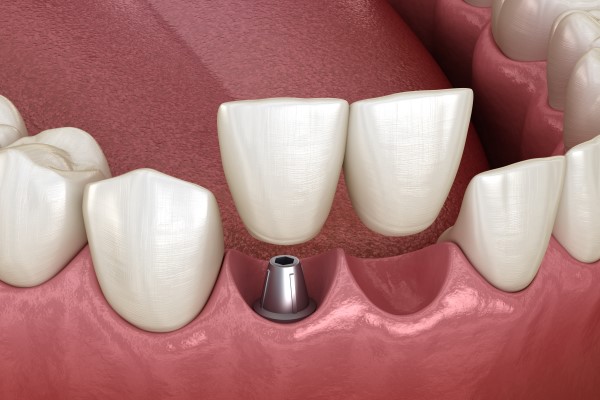When Are Mini Dental Implants Recommended?

Mini dental implants are recommended for patients who want to replace missing teeth but do not seek or are not suitable for regular restorations. In some cases, the person may not be ready for the invasive surgery necessary for traditional implants, and others may not have the bone volume to hold the implant.
Dental implants
Dentists usually substitute lost teeth with bridges, dental implants or dentures. Bridges and dentures are false teeth that lie on the surface of the gum, but dental implants are placed inside the jawbone to make them fixed. The procedure requires a surgery to insert titanium screws and the abutment into the jawbone, and the bone is given some time (between three to six months) to fuse around the abutment.
After the bone heals around the implants, a tiny post will be attached to the implant that will serve as the anchor for the artificial tooth. Dental implants are generally preferred over dentures because they are stable and do not shift like dentures. For optimal results, there must be enough jawbone mass, or a bone graft procedure may be necessary.
Mini dental implants
Mini dental implants are structurally identical to traditional implants but are a bit smaller in form. According to the Mini Dental Implant Centers of America (MDICA), mini dental implants have two parts: a titanium screw with a ball end and a socket with an O-shaped rubber ring that connects the tooth to the screw. The dimensions of traditional implants are 3.4 to 5.8mm wide, while mini implants have a diameter of 1.8 to 3.3mm and a length of 10 to 15mm.
Uses of mini implants
Mini implants are compatible with almost all types of teeth replacements, including dentures, fixed crowns and bridges. The American Academy of Implant Dentistry suggests that mini implants are useful for locking loose and lower arch dentures.
Options for mini Implants
Getting regular implants requires several months of treatment and a minimum of two visits to the dental office. In some cases, additional appointments may be necessary for the bone grafting process to hold the implants. However, many patients cannot undergo invasive surgery and repeated dental office visits or have jawbone mass that cannot maintain or support a full-sized implant, and that is common.
In any of the above cases, mini implants are the best alternatives. Dentists can insert mini dental implants in a single office visit under local anesthesia without any stitches. And fortunately, you can start using the new teeth the same day.
Caring for mini implants
Mini dental implants demand the same care as natural teeth. Brush twice daily with a fluoride toothpaste and floss at least once daily. Since the gum may still be sensitive after the implant procedure, using a soft-bristled toothbrush is advisable.
Final note
Losing your natural teeth can be somewhat debilitating and may affect your confidence and smile. Mini implants are a great way to restore your smile and normal tooth function so that you can return to your daily routine. The dentist will let you know if you are a suitable candidate for mini implants.
Request an appointment here: http://newyorkdmd.com or call New York DMD at (917) 284-9680 for an appointment in our New York office.
Recent Posts
Your oral surgeon will recommend the right oral surgery for your needs. Each treatment corrects a specific issue and can enhance your oral health in different ways. Knowing these procedures can prepare you well for the next visits. Here are the common oral surgery procedures and how they can benefit you.The oral surgeon will recommend…
Appearance may be one of the first things people think about when it comes to tooth replacement. However, improved appearance is just one of the many benefits of replacing missing teeth. Tooth replacement can be key to improving not only how you feel about your smile but also boosting your oral health.Whether one chooses dentures,…
Dental veneers have become an increasingly popular solution for those looking to improve the aesthetics of their teeth to address issues like discoloration, chipping, or misalignment. These super thin, customized tooth covers, usually constructed from porcelain or composite resin, are attached to the front exterior of teeth to improve their look. But what does the…
A broken tooth is typically something that you will want to have addressed immediately. While not every break in a tooth is considered an emergency, most of the time, it is ideal to take action as soon as possible. The type of break in the tooth will likely determine the necessary action. However, in order…


